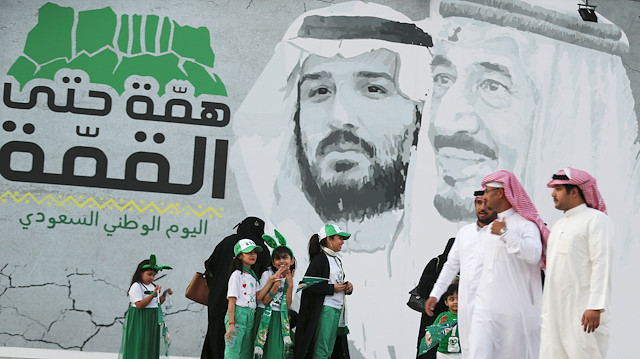
Far closer relationship between those who performed killing and Saudi crown prince, UN special rapporteur Callamard says
UN special rapporteur on extrajudicial executions said Friday that Saudi journalist Jamal Khashoggi died "as a result of an extrajudicial killing for which the Kingdom of Saudi Arabia is responsible".
In her article -- titled MBS [Saudi Crown Prince Mohammed bin Salman] can’t take ‘responsibility’ for Khashoggi’s murder and also blame his minions -- published on The Washington Post, Agnes Callamard said that her six-month investigation showed that claims by the Saudi authorities that a "rogue operation" killed Khashoggi "are not borne out by the evidence".
Khashoggi, a Saudi national and a columnist for The Washington Post, was killed and later his body was dismembered by a group of Saudi operatives in October 2018, shortly after he entered the consulate in Istanbul, to get a marriage certificate.
After weeks of denying involvement, Saudi Arabia admitted that Khashoggi had been killed at the consulate, but claimed that the royal family had no prior knowledge of a plot to murder him.
According to reports by the UN and other independent organizations, he was murdered and also his body was dismembered. Saudi Crown Prince Mohammed bin Salman accepted responsibility for the killing recently, but denied ordering it.
Referring to bin Salman's interview last week, Callamard said: "Indeed, state responsibility as defined under international human rights law is not a question of which state official ordered the assassination nor whether those who committed the crime acted on their own initiative. The state is responsible for acts committed by its officials under cover of their official status and using means and assets placed at their disposal by the state."
- 12 months of 'denial and disinformation'
The UN reporter went on to say that a “responsible” statesman would not have been complicit in a year of "denial and disinformation" about the responsibility.
"A 'responsible' leader would not have tolerated 12 months of continued implementation of the very policies of intolerance and repression that led to Khashoggi’s murder," she added.
Callamard said that the "official admission" from Saudi Arabia came on the first anniversary of Khashoggi’s death, and three months after her report, in which she stressed on why the killing of the Saudi journalist must be understood to have been a "state killing".
While quoting bin Salman as saying: "This was a mistake, and I must take all actions to avoid such a thing in the future," Callamard underlined that the killing of Khashoggi was no “mistake”, adding that there are many actions that the crown prince should take.
She stressed that essential actions should be taken, including issuing a public acknowledgment of full responsibility to the people of Saudi Arabia, a formal apology at the state level given to Khashoggi’s family and to his fiancee, Hatice Cengiz,
The UN journalist said that the crown prince's commitment "must go beyond words alone", adding that all those in the kingdom imprisoned at the moment for the peaceful expression of their opinions and beliefs "should be released immediately".
"The circumstances and institutions that enabled the execution of Khashoggi must be thoroughly and impartially assessed in a transparent fashion," she said, adding that the announced reforms to the Saudi security agencies should have begun.
- 'Far closer relationship between those who performed killing and crown prince'
Callamard in her article also stressed on the chain of command involved in the killing of the Saudi journalist.
While questioning the “masterminds" behind the crime, Callamard recalled that bin Salman in his recent interview insisted that he did not order the crime, pointing instead to the layers of officials that stand between him and those who did the killing.
"He seems to suggest that this protects him from individual liability. But that’s not how it works. Not under international law," she noted.
"In fact, my investigation established credible evidence of a far closer relationship between those who performed the killing and the crown prince -- far closer than he has admitted."
She also said that the evidence shows that the operation that killed the journalist involved Saudi state planning, resources and assets.
"In the two weeks that followed the killing, Saudi officials went further -- taking steps apparently to destroy evidence of the killing -- even as they were denying his death. This could not have taken place without the crown prince’s say-so," Callamard said referring to the crown prince’s criminal liability under international law.
Callamard concluded that only a proper criminal investigation into the criminal liability of Saudi top officials in the chain of command behind Khashoggi's killing will determine how far bin Salman’s personal responsibility goes.


